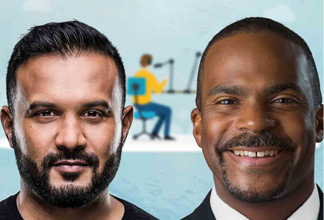How a Canadian Startup Used AI to Detect the Coronavirus
Written by Judy McKinnon | Published on March 4, 2020
Written by Judy McKinnon | Published on March 4, 2020
When Dr. Kamran Khan, a Canadian physician and entrepreneur, woke up early on Dec. 31, 2019, it wasn't the dawn of a new decade he had on his mind – it was the threat of a possible global viral outbreak.
That morning, the doctor's technology company, BlueDot – which focuses on fighting epidemics using artificial intelligence – saw some concerning results from its usual scan of hundreds of thousands of articles around the world. Data was indicating an outbreak of pneumonia among 27 people centred on a market in Wuhan, China.
How did a Canadian doctor and his Toronto tech startup end up at the forefront of the 2020 Wuhan coronavirus outbreak ahead of the World Health Organization? It's a fascinating journey that Dr. Khan recently shared with host John Stackhouse on an RBC Disruptors podcast episode called "How a Canadian Company Used AI to Detect the Coronavirus."
Dr. Khan, an infectious disease specialist at St. Michael's Hospital in downtown Toronto and professor of medicine at the University of Toronto, raised $9.4 million in 2014 and started hiring 40 employees to build automated infectious disease surveillance programs that use machine learning and natural language processing. Dr. Khan and Stackhouse talked about the early days of BlueDot, what happened on the morning of Dec. 31, 2019 and more. Here are some highlights from their conversation.
"I wake up and we have a number of staff that monitor news feeds of various infectious disease risks that are appearing around the world. Essentially we've developed a platform that uses artificial intelligence to be scanning hundreds of thousands of different articles around the world every single day looking for outbreaks involving over 150 different diseases. And we are doing this in over 65 languages every 15 minutes, 24 hours a day," Dr. Khan said. That morning, an alert identified an outbreak that appeared very similar in nature to SARS. "And, you know, when you get that information, at that moment you don't immediately know that this is going to turn into a worldwide outbreak. But this is where human intelligence is necessary to work in a complementary way with artificial intelligence." What happens first? "We do a little bit of a sanity check," Dr. Khan said, to ensure the information being interpreted is accurate and consistent.
"For the last 17 years, I've been working with data on the entire world's air travel. This is something I studied as a professor for more than a decade. Seems like an odd thing perhaps for a physician to be studying this global network. But it really struck me that in many ways it had parallels with our own vascular anatomy and physiology," said Dr. Khan. Studying loads of anonymous data on passenger flight itineraries led Dr. Khan to conclude that diseases of people spread by the movements of those people. "It allowed me to understand the anatomy, if you will, of these arteries that are connecting the whole planet and even the physiology of how there are flows through these arteries." Ultimately, he launched BlueDot because he felt he and the medical community were always chasing diseases rather than harnessing artificial intelligence to get ahead of killer viruses.
"We're in this interesting era with data and analytics and technology. When I see a patient one at a time, that's a pretty incredible opportunity and experience to affect someone's life," Dr. Khan said. But with the potential to reach billions of people, he said "that opportunity is just far too meaningful to pass up. And it's what gets me out of bed inspired every day to think that I could be part of something that's so much bigger than myself. And I think ultimately, deep down for all of us, that's probably what we're all seeking in our lives in some ways to be part of something that's bigger than just us."
To hear more of Dr. Khan's fascinating conversation with host John Stackhouse, including challenges for healthcare innovation in Canada, find the full RBC Disruptors podcast on Apple Podcasts, Google Podcasts and SoundCloud.
For a roundup of coronavirus coverage, plus timely reminders and tools that can help when markets are volatile, click here.
RBC Direct Investing Inc. and Royal Bank of Canada are separate corporate entities which are affiliated. RBC Direct Investing Inc. is a wholly owned subsidiary of Royal Bank of Canada and is a Member of the Canadian Investment Regulatory Organization and the Canadian Investor Protection Fund. Royal Bank of Canada and certain of its issuers are related to RBC Direct Investing Inc. RBC Direct Investing Inc. does not provide investment advice or recommendations regarding the purchase or sale of any securities. Investors are responsible for their own investment decisions. RBC Direct Investing is a business name used by RBC Direct Investing Inc. ® / ™ Trademark(s) of Royal Bank of Canada. RBC and Royal Bank are registered trademarks of Royal Bank of Canada. Used under licence.
© Royal Bank of Canada 2025.
Any information, opinions or views provided in this document, including hyperlinks to the RBC Direct Investing Inc. website or the websites of its affiliates or third parties, are for your general information only, and are not intended to provide legal, investment, financial, accounting, tax or other professional advice. While information presented is believed to be factual and current, its accuracy is not guaranteed and it should not be regarded as a complete analysis of the subjects discussed. All expressions of opinion reflect the judgment of the author(s) as of the date of publication and are subject to change. No endorsement of any third parties or their advice, opinions, information, products or services is expressly given or implied by RBC Direct Investing Inc. or its affiliates. You should consult with your advisor before taking any action based upon the information contained in this document.
Furthermore, the products, services and securities referred to in this publication are only available in Canada and other jurisdictions where they may be legally offered for sale. Information available on the RBC Direct Investing website is intended for access by residents of Canada only, and should not be accessed from any jurisdiction outside Canada.

Sustainable practices may mean untapped profits for Canadian farmers, says RBC Economics and Thought Leadership.

Top takeaways from a discussion about the climate challenges and solutions that can be found in farming.

Key takeaways from a conversation on Black representation in a recent episode of Disruptors, an RBC podcast.